Cette publication est également disponible en :
Français
In 2011, Luca Maffei and his father founded the composition house Atelier Fragranze Milano (AFM). With French perfumer Antoine Lie acting as consultant, the company works exclusively with the niche sector. Interview.
You compose for brands with very distinctive olfactory cultures. How do you get down to work when you first receive a new brief?
I start by studying the backstory of the company that has contacted me. I then use role-playing, first trying to put myself into the client’s mind. What message do they want to send to their public? I also try to think like a consumer who might be interested in buying the new scent. I try to imagine the perfume I’d like to wear from this brand. This is an absolutely crucial stage. A perfumer is like a translator. If the brief is clear then everything’s fine. But sometimes clients don’t know exactly what they want.
How do you respond when this happens?
You have to stay clear-headed and look at the brief in a different way. You might ask the client to reformulate it, to use different words. Or you might suggest to smell ingredients and accords and carefully note how they react. It’s a challenge that is very much part of creating a perfume. It is what drove me, and my father, to become perfumers. Working alongside him I was lucky enough to experience the incredible boom years of the late 1990s. For him, a brief was a game that involved getting inside the heads of marketing directors.
It takes time to develop a perfume, and yet brands are often tied to fixed deadlines.
At Givaudan’s Perfumery School in Grasse, the former director Françoise Marin told me that you have to cultivate three qualities to succeed. First was curiosity then creativity – both of them foster the desire to experiment with associations of ingredients. The final quality was persistence. “Otherwise I’d advise you to change career,” was what she said. To my mind, persistence is primordial when it comes to sticking to deadlines imposed by clients and my own busy agenda. Spending endless amounts of time on a working session with any one client is unthinkable. Working on several projects at the same time prevents you from becoming mentally saturated: a woody fragrance in the morning, a floral perfume in the afternoon, for example. That’s the best way to break up your working day and keep some perspective. Occasionally the first formula is an instant hit. That’s what happened with Garuda by Jul & Mad. On the other hand, L’Attesa by Masque Milano, an ambery iris, took over eighteen months to develop. I remember altering the formula hundreds of times. Sometimes you just want to say “that’s it, I’m out; you’ve come to the wrong perfumer.” But I’m someone who doesn’t give up, I always find the energy I need to win the project.
Is it true that you always have more freedom when working for a niche brand?
To answer your question, I’d first have to work with a big-name fashion house one day so that I could compare the experience. You never know, it might happen! I’d love to find out what it’s like to play on the biggest stage instead of always performing in more modest venues. However, brands categorised as niche never set any limits on my creativity. They allow me to take risks and impose my vision. My clients set me the challenges of avoiding accords that are too obvious. My responsibility is to find new interpretations. I’m given total freedom to choose the raw materials. I’ve gathered together everything I need, here in our premises in central Milan, for creation, evaluation and production. It’s a real asset. I took my inspiration from the large composition houses I visited and set up similar structures, but on a smaller scale and in the heart of Milan. I’m lucky enough not to be cut off, to be too far from where the action is. It’s important to feel the city pulsing away right beneath my window.
At Atelier Fragranze Milano, you have a creative partnership with the consultant Antoine Lie, who lives in Paris. How would you define your relationship?
We share the same vision of perfumery. We are adamant that creators have to be in direct contact with the client at every stage of the process of making a perfume. Antoine and I are in touch with each other every day. I might spend a week in Paris and he’ll spend the following week in Milan. We swap opinions about absolutely every one of our projects, even though we each run our developments completely independently. It helps us to stay creative. When I’m with him I try to learn as much as possible from the experience he has of working with major houses such as Armani, Guess and Tom Ford. And when he’s with me, he learns…Italian!
You started out in 2007. How has the world of perfume changed over the past fifteen years?
Perfumery has opened up to the mainstream by becoming a cultural movement. Niche has really taken off. But creativity is perhaps a bit more restricted.
Looking back, how do you feel about your creations?
I’m generally pretty easy on myself, I wear my own creations more and more often – I think that’s a sign! It wasn’t always the case. I like Le Loden by Jacque Fath, Ceci n’est pas un flacon bleu 1.5 from Histoires de Parfums, and Garuda by Jul et Mad. It’s not that common after spending maybe a month sniffing a formula fifty times a day as you work to get it right, a bit like a chef who is forced to taste the same dish for weeks at a time. It’s almost like I’ve ended up being my own number one client. Imagining the fragrances I could wear myself, that’s my vision of perfumery.
Masque Milano, I Fiori del Male, Laboratorio Olfattivo, Nobile 1942, and others. The scents you sign are mostly for niche Italian houses. Do you feel that there is an Italian style of perfumery?
I think that a lot of people love what comes from here in general. It’s not that different from French style. If I was pushed to define it, I’d say that it’s an ability to interpret the bello, the beautiful, a legacy of Greco-Roman culture and European roots. It’s reflected in attention paid to proportions, detail, harmony and balance between ingredients, just like in the fashion, food and art worlds.
You were born in Milan, so does Esxcence mean something special to you?
Milan is my city. It represents my roots, it’s where I’ve chosen to work from. It’s always pretty exciting when you see that it becomes the place to be, for a few days at least, as perfumery’s number one showcase, visited by everybody from the niche sector worldwide, clients, friends and competitors.
What are your standout memories of Esxcence?
I’ve got plenty of them. First, back in 2013, the perfumer Maurizio Cerizza encouraged me to enter the event’s competition, The Scent of Excellence, only open to creators aged under thirty, with Iris Magnifica, which was one of the five finalists. I was also very moved, two years later, when Jul et Mad presented the collection that we’d composed for them. It led to Néa winning an Art and Olfaction Award in the independent category in 2016 in Los Angeles.
—
Find out more on the Atelier Fragranze Milano website: atelierfragranze.it
REPORT « NICHE AND CONFIDENCES »
- Niche perfumery moves centre stage, by Jessica Mignot
- Sylviane Lust (Beauty by Kroonen) : “We choose complex fragrances that evolve on the skin, and that tell you the perfumer has been given a free hand.”, by Jessica Mignot
- Karine Torrent (Floratropia) : “In my view, 100% natural perfumery is the new niche”, by Jessica Mignot
- Barbara Herman (Eris Parfums): “Whether consciously or not, with each new creation I tend to explore a very different path from the previous one”, by Sarah Bouasse
- Serge Laugier (Le Paravent): “It’s important to me to offer the more niche fragrances, because they always have an unique olfactory signature”, by Jessica Mignot
- Cécile Zarokian: “It’s possible to compete successfully with the big fragrance houses”, by Guillaume Tesson
- Pissara Umavijani (Dusita): “The hardest thing for a perfumer is expressing your signature style in different registers”, by Sarah Bouasse
- Clara Feder and Michel Gutsatz (Le Jardin retrouvé): “We’re trying to build a balanced collection while sticking to our motto: avant-garde as a legacy.”, by Jessica Mignot
- Liam Sardea (LKNU): “We try to guide each person to create their own constellation in this vast cosmos”, by Guillaume Tesson
- Dhaher bin Dhaher (Tola): “I’m spending more and more of my time breaking down barriers between olfactory cultures”, by Guillaume Tesson
- Nathalie Feisthauer (LAB Scent): “For me, niche is a definition of beauty”, by Guillaume Tesson
- Franco Wright (Luckyscent): “Ultimately customers see how the niche category pushes fragrance in more interesting directions”, by Anne-Sophie Hojlo
- Luca Maffei (Atelier Fragranze Milano): “Niche perfumery allows me to take risks”, by Jessica Mignot
- Murat Katran and Mert Guzel (Nishane): “Istanbul is literally a bridge between cultures”, by Guillaume Tesson
- Agnieszka Lukasik (Galilu): “Now, the brands come to us”, by Anne-Sophie Hojlo








Comments